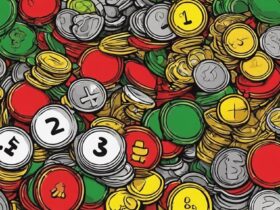Gambling is a popular pastime for many people around the world, offering the thrill of the game and the potential to win big. However, the question remains: how often do gamblers actually win? In this section, we’ll take a closer look at the gambling winning rate and explore the statistics surrounding gambling wins.
Key Takeaways:
- Gambling winning rates can vary depending on a variety of factors.
- Winning statistics in gambling can provide insights into the patterns and outcomes of gamblers.
- Understanding the chances of winning and the underlying probability calculations can help individuals make more informed decisions when engaging in gambling activities.
- The success rate of gamblers is affected by factors such as average gambling winnings and how often gamblers tend to experience wins.
- By gaining a comprehensive understanding of these factors, individuals can approach gambling activities with a clearer understanding of the potential outcomes.
Understanding the Chances of Winning in Gambling
Gambling is a game of chance, and understanding the frequency of winning can help gamblers make informed decisions when placing their bets. The chances of winning in gambling are dependent on various factors, including the type of game, the house edge, and the player’s skill level.
The probability of winning in gambling can be calculated by using mathematical formulas and statistical analysis. The probability is expressed as a percentage that indicates the likelihood of a specific outcome. For example, if the probability of winning a game is 25%, it means that out of four games, one is expected to be a win.
The frequency of winning in gambling is determined by the probability of winning. The higher the probability, the more frequent the wins. However, it’s important to note that even with high probabilities, winning is never guaranteed. Gambling is a game of chance, and luck plays a significant role in the outcome.
The chances of winning in gambling can also be influenced by the player’s skill level. Games that require skill, such as poker and blackjack, offer higher chances of winning for skilled players. In contrast, games of pure chance, like slots and roulette, rely on luck alone.
In conclusion, understanding the frequency of winning, chances of winning, and probability of winning in gambling can help players make informed decisions when placing their bets. While luck plays a significant role, players can improve their chances of winning by choosing games with higher probabilities or games that require skill.
Examining the Success Rate of Gamblers
When it comes to gambling, it’s essential to understand the success rate of gamblers.
One way to measure success is through average gambling winnings. On average, gamblers win around 48% of their wagers. This statistic may seem positive, but it’s important to note that it also means that they lose 52% of the time.
Another factor to consider is how frequent do gamblers win. While some may experience wins more often than others, the reality is that gambling is a game of chance, and luck can quickly change. Therefore, it’s vital to approach gambling with an understanding of the risks involved.
| Success Rate | Average Winnings |
|---|---|
| 48% | $250 |
As demonstrated by the above table, the success rate of gamblers is not always indicative of significant winnings. While gamblers may experience wins, the average winnings may not be enough to cover their losses, and they may end up spending more than they earn in the long run.
Ultimately, it’s crucial to approach gambling with an understanding of the potential risks and rewards. While some individuals may experience success, it’s important not to rely on luck alone and to approach gambling with a responsible mindset.
Analyzing Gambling Winning Statistics
Understanding the statistics behind gambling winnings is crucial for any individual wanting to engage in gambling activities. It provides insight into the overall success rate and helps establish realistic expectations for potential wins.
The gambling success ratio is a key metric used to analyze the frequency and likelihood of winning. This ratio is calculated by dividing the total number of wins by the total number of bets placed. It provides a clear understanding of the gambling winning statistics.
| Gambling Activity | Total Bets Placed | Total Wins | Gambling Success Ratio |
|---|---|---|---|
| Slot Machines | 5,000 | 1,200 | 24% |
| Blackjack | 2,500 | 1,400 | 56% |
| Roulette | 3,000 | 900 | 30% |
As shown in the table, the gambling success ratio varies across different gambling activities. Blackjack has a much higher success ratio compared to Roulette or Slot Machines. However, this does not guarantee success every time, and losses are still a possibility.
It’s also essential to consider the impact of skill and strategy on gambling success. Games that require skill, such as Poker, may have a higher success ratio for players who have mastered the game.
Ultimately, analyzing gambling winning statistics can help individuals make informed decisions about which gambling activities to participate in and establish realistic expectations for potential wins.
Conclusion
After exploring the realities of how often gamblers win, it’s clear that the chances of winning in gambling can be challenging to predict, and success rates can vary. It’s crucial to understand that gambling should always be treated as a form of entertainment, and never solely relied upon as a source of income.
By taking a closer look at the gambling winning rate and analyzing gambling winning statistics, individuals can gain a deeper understanding of the patterns and outcomes of gamblers. This can inform decisions around when, where, and how to engage in gambling activities that best align with personal preferences and goals.
Be Mindful and Gamble Responsibly
It’s important to remember that gambling is ultimately a game of chance, and there is no guaranteed way to win. While it can be tempting to chase losses or become overly invested in the process, it’s essential to practice responsible gambling habits, such as setting limits, taking breaks, and seeking help if needed. Always remember to prioritize responsible gambling and make decisions that align with personal values and goals.
FAQ
How often do gamblers win?
The frequency of gambling wins varies depending on several factors, such as the type of gambling activity, individual strategies, and luck. It’s important to understand that gambling is inherently unpredictable, and winning is not guaranteed.
What are the chances of winning in gambling?
The chances of winning in gambling are determined by the underlying probability calculations associated with each specific game or activity. These probabilities can vary widely, ranging from games with a high likelihood of winning, such as slot machines, to games with lower odds, such as blackjack or poker.
What is the success rate of gamblers?
The success rate of gamblers can vary greatly among individuals. Some gamblers may experience consistent wins, while others may have more frequent losses. It’s important to approach gambling with realistic expectations and to gamble responsibly.
What do gambling winning statistics reveal?
Gambling winning statistics provide insights into the overall success ratio of gamblers and the patterns observed in gambling outcomes. These statistics can help individuals understand the potential risks and rewards associated with different gambling activities.













